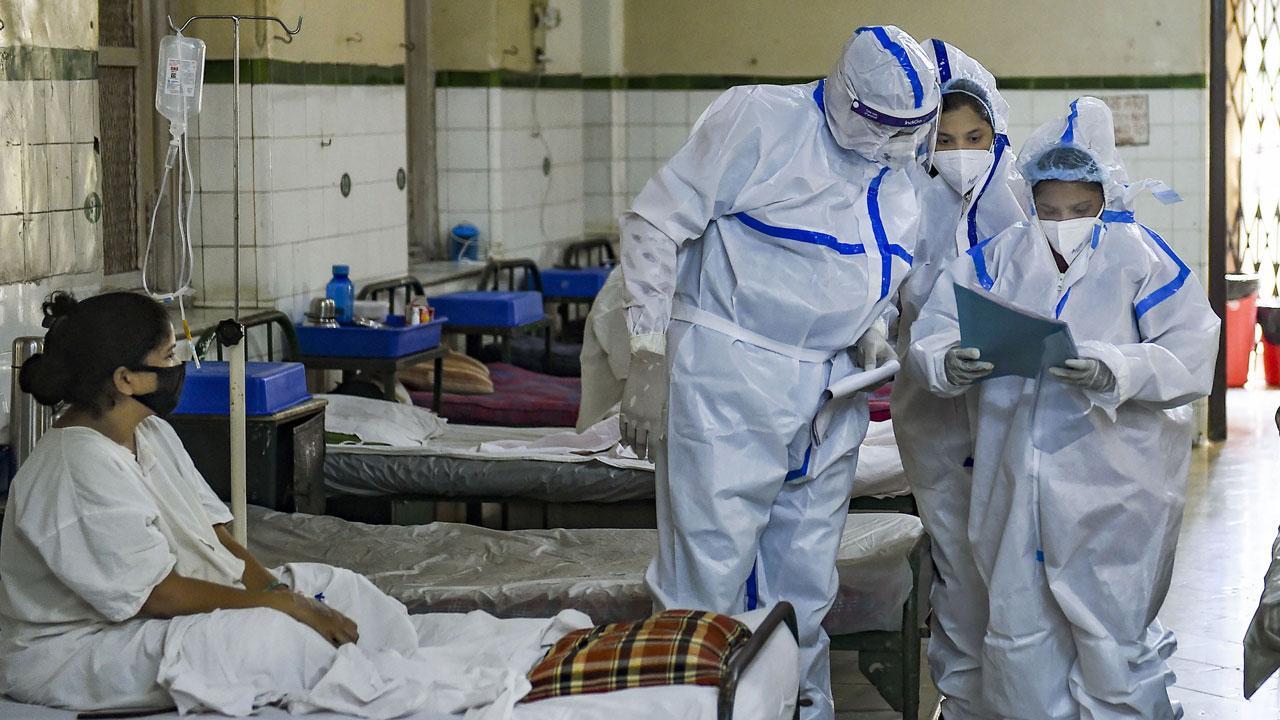Intestinal or GI mucormycosis is very 'rare disease' and most commonly involves stomach or large intestine, according to doctors at the Sir Ganga Ram Hospital in Delhi

A doctor wearing a PPE kit attends a patient in a hospital. Pic: PTI
Two patients at a leading private facility here, both of whom had tested positive for Covid-19-19, were diagnosed with Mucormycosis in the small intestine, which the doctors termed as "rare" cases.
ADVERTISEMENT
Mucormycosis or black fungus, most commonly involves rhino-orbital-cerebral system or the lungs. Intestinal or GI mucormycosis is very "rare disease", and most commonly involves stomach or large intestine, according to doctors at the Sir Ganga Ram Hospital here.
A 56-year-old Delhi resident, who had lost three of his family members including his wife to Covid-19, had barely completed the last rites of his wife when he experienced pain in his abdomen. He had tested positive for coronavirus along with his wife and had been experiencing mild symptoms initially, the hospital said in a statement.
Also read: Explained: Why Covid-19 patients are vulnerable to mucormycosis, or black fungus; causes, symptoms, prevention
His abdominal pain was considered gastritis or stress-related and self-medication for acidity was done, which delayed proper treatment by three days, it said.
He was finally evaluated in the Covid-19 emergency of Sir Ganga Ram Hospital by Dr Ushast Dhir, senior consultant in the department of Surgical Gastroenterology and Liver Transplantation, it said.
The CT scan revealed that the first part of his small intestine or jejunum had perforated. His Covid-19 ailment also had worsened by now requiring ventilator support. The patient was admitted and taken up urgently for surgery, hospital authorities said.
"Ulceration of jejunum in the patient raised my suspicion of fungal disease, and the patient was immediately started on anti-fungal treatment. We sent the portion of removed intestine for biopsy," the doctor said.
In another case, a 68-year-old man, who was happy to know that his father had recovered from Covid-19, started having mild abdominal pain. He was a diabetic and had received steroids for treatment of Covid-19. The patient had no associated fever and pain was very mild. His clinical examination also did not show any signs of intestinal perforation, the statement said.
But, high index of suspicion lead Dr Piyush Ranjan, senior consultant of medical gastroenterology at Sir Ganga Ram Hospital, to get an urgent CT scan of the patient. The CT scan revealed small intestinal perforation similar to the first one, it added.
"The biopsy confirmed our worst fear of mucormycosis of small intestine in both patients. Both these patients had Covid-19 and had diabetes, but only one of them had received steroids," the hospital said in the statement.
Both these patients were operated by Dhir, who revealed that these patient had "similar intra-operative findings" where jejunum had out-pouchings called diverticula and these diverticula had perforated along with surrounding ulceration, it said.
"These patients, in majority, are immune-compromised. Majority of gastro-intestinal mucormycosis is seen in organ transplant recipients. The cases treated at Sir Ganga Ram Hospital were unique as they had Covid-19 and small intestine (instead of stomach/colon) was involved in both cases," the statement said.
GI mucormycosis is rare and the patient presents with vague abdominal symptoms. In recent times, history of Covid-19 exposure along with treatment with steroids should warrant an early CT scan of abdomen, doctors said.
Over 60 cases of black fungus have been reported at Sir Ganga Ram Hospital till date, amid the second wave of the pandemic, a senior official said
This story has been sourced from a third party syndicated feed, agencies. Mid-day accepts no responsibility or liability for its dependability, trustworthiness, reliability and data of the text. Mid-day management/mid-day.com reserves the sole right to alter, delete or remove (without notice) the content in its absolute discretion for any reason whatsoever
 Subscribe today by clicking the link and stay updated with the latest news!" Click here!
Subscribe today by clicking the link and stay updated with the latest news!" Click here!






